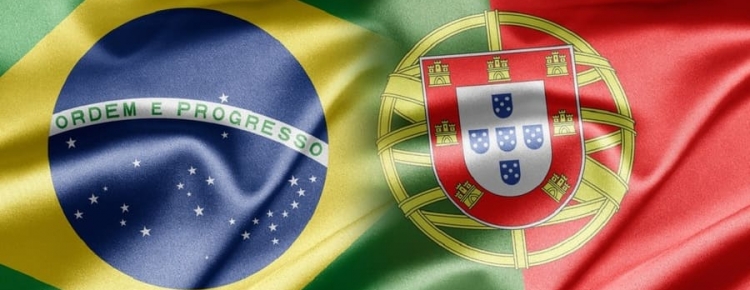
Two Countries – Two Different Versions of Portuguese
Anyone who starts thinking about learning Portuguese quickly discovers that, in fact, this language has two quite different versions: European, spoken in Portugal, and Brazilian, typical for the inhabitants of this Latin American country.
Beginners often ask: “Will I be understood if I go to Portugal with the Brazilian version (or vice versa: to Brazil with the European version)?” Don’t worry, Brazilians and Portuguese understand each other quite easily because Portuguese is, of course, still one language, which has its own phonetic, lexical, orthographic, grammatical, and etiquette-related characteristics in each variant.
The goal of this article is to introduce the most general and fundamental differences between the Portuguese variants. We will only touch on the main aspects where the versions diverge, focusing more on lexical differences, because they are directly related to mutual understanding between speakers and cause the most confusão (confusion) and brincadeiras (jokes).
Phonetic Differences
So, let’s start with pronunciation. Even if you don’t know a word of Portuguese, if you listen first to a Portuguese speaker and then to a Brazilian one, you’ll immediately notice that Brazilians speak more openly, stretching the vowels, whereas Europeans’ speech is more abrupt, closed — it gives the impression that they swallow all the vowels in words. This happens because closed vowels (in Portuguese all vowels are divided into open and closed depending on their position in the word) are pronounced very tightly by the Portuguese, barely opening their mouths, and they also reduce vowels, i.e., pronounce them indistinctly. That’s why Brazilian speech seems more melodic and fluid.
Moreover, the Portuguese, as we say, “shush” (“shicam”), while Brazilians prefer to pronounce “s” in the same words. There are many other identical letter combinations that are pronounced differently in each version. To see the phonetic difference for yourself, watch a dialogue between a teacher from Portugal and a teacher from Brazil where they discuss pronunciation differences between the two versions:
What About Vocabulary?
The lexical difference between the two variants of Portuguese is very diverse and affects all language styles – from conversational to business, so we’ll limit ourselves to just a few vivid examples from everyday life, which anyone who knows only one version might encounter.
Let’s start with greetings: in Europe when meeting someone (besides the traditional “good morning/good afternoon” Bom dia / Boa tarde, which also sound different due to phonetic differences between the variants), you’re more likely to hear *olá!*, whereas in Brazil people prefer the short informal oi!
Getting around the city can also be a bit confusing: in Portugal, you’ll get a surprised look from a local if you ask the Brazilian way: where is um ponto de ônibus (a bus stop), because there it’s commonly called uma paragem de autocarro.
Let’s stop by a café to have a cup of coffee, which both countries adore. The phrase: “Moço, um cafezinho, por favor” – will immediately reveal a Brazilian, because the Portuguese will say: “Uma bica, se faz favor”. And the word for “waiter” is different too: garçon (BR) and empregado (PT), and the word “cup” is different in each country: xícara (BR) and chávena (PT), not to mention the many names for types of coffee preparation in Portugal: galão, carioca, pingado, etc., which would confuse Brazilians.
And so it goes everywhere, no matter which area of life you look at: clothing, for example, can also raise many questions. If, knowing the Brazilian version of Portuguese, you walk through a shopping mall in Portugal, you’ll be baffled by the many different words meaning the same thing: *terno* (BR) and *fato* (PT) mean “suit”, *meias* (BR) and *peúgas* (PT) mean “socks”. There are also identical words that refer to different clothing items in Brazil and Portugal: *camisola* in Brazil means loungewear, like the top of pajamas, while in Portugal it’s a warm sweater you can respectably wear in public; *cuecas* in Brazil are male underwear only, while in Portugal it refers to both men’s and women’s underwear. And this is just a small sample of examples from standard, neutral language.
A few more very simple everyday words in different versions of Portuguese:
| European Portuguese | Brazilian Portuguese |
| autocarro | ônibus (bus) |
| comboio | trem (train) |
| casa de banho | banheiro (bathroom) |
| relva | grama (grass) |
| cardápio | ementa (menu) |
| sumo | suco (juice) |
| geladeira | frigorifico (refrigerator) |
| xícara | chávena (cup) |
| pequeno almoço | café de manhã (breakfast) |
Caution: Slang!
Needless to say, slang (this word, by the way, also sounds different in Brazil and Portugal: *gíria* (BR) and *calão* (PT)) should be treated very carefully. For example, the completely neutral word *rapariga* (PT) meaning “girl” in Portuguese, in the Brazilian version refers to “a woman of easy virtue”. And the word *bicha*, which in Portugal means “line/queue”, in Brazilian Portuguese is a crude term for a homosexual person.
Of course, both countries have jokes about language differences, where Portuguese and Brazilians laugh at each other’s versions. For instance, here’s a funny dialogue between a Brazilian who arrives in Portugal and a Portuguese man working at a pizzeria:
Watching it, you’ll see that despite many *desentendimentos* “misunderstandings” caused mainly by lexical differences, these two people eventually understand each other, because after all, they are speaking one and the same language – Portuguese! That’s why those who decide to learn Portuguese should choose a variant right from the beginning, but during the learning process, also familiarize themselves – at least theoretically – with the parallel version, so that, once on another continent, they can more quickly get used to the new variant.
Senhoras e senhores! – Differences in Forms of Address
Speaking of differences in Portuguese versions, we can’t avoid mentioning the forms of address, which are tied not only to etiquette but also to grammar. In Brazil, there’s practically one neutral form of address in the second person singular: *você*, which means both “you” (informal) and “You” (formal), and is used when speaking to family members as well as strangers or bosses. In Portugal, the informal address *tu* is widely used, and it has its own verb form in every tense. The form *você* exists in Portugal too, but it’s much less common than in Brazil and occupies an intermediate position between *tu* and *o senhor / a senhora* (more formal addresses, which are also used in Brazil, but in very formal, official speech).
In addition to needing a certain linguistic experience and intuition in Portugal to feel when *tu* is appropriate and when *você* is, you’ll also have to memorize one extra verb form in each tense (and there are quite a few tenses in Portuguese grammar), compared to the Brazilian version.
Is It Written the Way It Sounds?
Looking at spelling in the different variants, you’ll also come across differences, despite a recent spelling reform that was supposed to unify writing in all variants of Portuguese. Nonetheless, differences remain. For example, Brazilians don’t write “silent” consonants in words like ótimo, ação, fato, whereas the Portuguese still write these consonants: óptimo, acção, facto. Or take the names of months – the Portuguese write them with capital letters, while Brazilians use lowercase: Abril – abril…
Of course, there are also grammatical constructions and grammar rules that differ between Brazil and Portugal, but it’s impossible to cover everything in a short article. As the Portuguese say: “Meter a Róssio na Betesga”, which is the equivalent of our “to try to embrace the boundless,” and by the way, Brazilians don’t use or are unlikely to understand this idiom. You’ll learn all the nuances once you begin studying this beautiful, diverse, yet at the same time unique and unified Portuguese language!
Final Invitation
Portuguese is an amazing and multifaceted language: the European and Brazilian versions each have their own features, which can sometimes confuse even advanced students. But don’t be afraid of the differences — with a good teacher of Portuguese, they become not an obstacle, but an exciting adventure!
If you truly want to master Portuguese — learn to understand and speak either version, recognize subtle differences in pronunciation, and confidently use vocabulary in various situations — we invite you to individual online Portuguese lessons at Skype-Language.com. You'll find qualified teachers, a friendly atmosphere, and a flexible learning schedule. Start speaking Portuguese today!

























